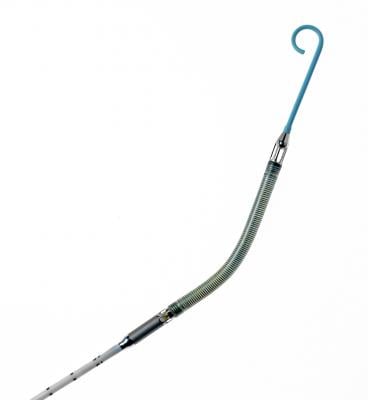
February 15, 2018 — Abiomed Inc. announced that it received an expanded U.S. Food and Drug Administration (FDA) Pre-Market Approval (PMA) for its Impella 2.5, Impella CP, Impella 5.0 and Impella LD heart pumps to provide treatment for heart failure associated with cardiomyopathy leading to cardiogenic shock. This approval expands the previous FDA indication for acute myocardial infarction (AMI) cardiogenic shock and post-cardiotomy cardiogenic shock (PCCS), received in April 2016.
The Impella heart pumps are the only percutaneous temporary ventricular support devices FDA-approved as safe and effective for cardiogenic shock in the setting of cardiomyopathy.
The Impella 2.5, Impella CP, Impella 5.0 and Impella LD Catheters, in conjunction with the Automated Impella Controller, are temporary ventricular support devices intended for short term use (≤4 days for the Impella 2.5 and Impella CP, and ≤6 days for the Impella 5.0 and Impella LD) and indicated for the treatment of ongoing cardiogenic shock that occurs immediately (<48 hours) following acute myocardial infarction or open heart surgery, or in the setting of cardiomyopathy, including peripartum cardiomyopathy, or myocarditis as a result of isolated left ventricular failure that is not responsive to optimal medical management and conventional treatment measures. Optimal medical management and conventional treatment measures include volume loading and use of pressors and inotropes, with or without intra-aortic balloon pumps (IABP). The intent of the Impella Support Systems therapy is to reduce ventricular work and to provide the circulatory support necessary to allow heart recovery and early assessment of residual myocardial function.
The data submitted to the FDA in support of this expanded PMA indication included an analysis of 93 patients from Abiomed's FDA-reviewed cVAD Registry study, as well as a comprehensive literature review including 109 patients treated with Impella from 32 clinical publications. This clinical data is reinforced by prior FDA studies demonstrating the safety and effectiveness of Impella support in both elective and emergent patient populations. This cardiomyopathy submission includes real-world safety data analysis required under FDA's MDR process incorporating over 50,000 patients treated from 2008 to 2017. Additionally, the cVAD registry collects data on more than 1,000 data elements and is guided by an independent physician steering committee.
Prior publications on Impella heart pump utilization in cardiogenic shock patients have been published in JACC (National Trends in the Utilization of Short-Term Mechanical Circulatory Support)1 and the Journal of Interventional Cardiology (Use of Impella 2.5 in Acute Myocardial Infarction Complicated by Cardiogenic Shock)2, representing nearly 12,000 Medicare/insurance patients and 154 cVAD Registry patients respectively.
"In the setting of cardiomyopathy with cardiogenic shock, the Impella heart pump platform stabilizes the patient's hemodynamics and directly unloads the heart providing blood flow to the body's organs," said George Batsides, M.D., FACC, chief of cardiac surgery and surgical director of mechanical circulatory support, Hackensack University Medical Center. "The goal of this therapy is to rest the heart muscle allowing recovery to the patient's baseline function. This treatment is the ideal solution to restore a patient's quality of life especially for patients older than 65 and not eligible for heart transplant."
Cardiomyopathy is a disease of the heart muscle that can lead to cardiogenic shock, a life-threatening condition in which the heart is unable to pump enough blood to support the body's vital organs. In the U.S. alone, cardiomyopathy causes 1.8 million hospitalizations per year and carries a 30% one year mortality rate after hospital admission3. Cardiomyopathy has annual Medicare costs of approximately $20 billion4 and is the number one cause of hospitalizations and length of stay in patients greater than 65 years old5.
Myocarditis is an acute form of cardiomyopathy and is sometimes identified as idiopathic cardiomyopathy. Myocarditis impacts a younger population of patients where it is estimated to cause 46% of dilated cardiomyopathy incidents in the United States. Myocarditis can be caused by a virus and impacts all age groups. It frequently leads to cardiac dysfunction and heart failure, and is responsible for approximately 10%6 of sudden death cases in young adults. In addition, cardiogenic shock associated with Peripartum and Postpartum Cardiomyopathy (PPCM) has also been included in the expansion of the label.
Abiomed will conduct a post-approval study of cardiomyopathy patients for five years using the cVAD Registry study. The cardiomyopathy study will join other post-approval studies from prior FDA indications using the prospective, IRB-approved multi-center cVAD Registry study.
The FDA also approved an expanded indication for the Impella 2.5 and Impella CP heart pumps for use during elective and urgent high-risk percutaneous coronary intervention (PCI) procedures. This expanded indication allows use of the pumps to support patients with severe coronary artery disease, complex anatomy and extensive comorbidities, with or without depressed ejection fraction (EF).
For more information: www.abiomed.com
Related Cardiogenic Shock Content
Watch the VIDEO “Overview of the National Cardiogenic Shock Initiative,” a discussion with William W. O’Neill, M.D., Henry Ford Hospital, Detroit, about the creation of a national initiative to start percutaneous hemodynamic support first before beginning revascularization.
Find out more about recent advances with Impella in the VIDEO “Editor's Choice of the Most Innovative New Technologies at TCT 2017.”
References:
- Stretch, R. National Trends in the Utilization of Short-Term Mechanical Circulatory Support: Incidence, Outcomes, and Cost Analysis. J Am Coll Cardiol. 2014 Oct 7; 64(14):1407-15. doi: 10.1016/j.jacc.2014.07.958.
- O'Neill, W. The Current Use of Impella 2.5 in Acute Myocardial Infarction Complicated by Cardiogenic Shock: Results from the USpella Registry. J Interv Cardiol. 2014 Feb; 27(1): 1—11. doi: 10.1111/joic.12080.
- Am. Journal of Epidemiology, February 19, 2016; 183(5): 462-470. Temporal Trends in Hospitalizations for ADHF in the US, 1998-2011.
- Linden A, Adler-Milstein J. Medicare Disease Management in Policy Context. Health Care Financ Rev. 2008;29(3):1-11.
- Circulation Heart Failure 2009; 2: 56-62. Loop Diuretics in Acute Decompensated Heart Failure.
- Fabre A, Sheppard MN. Sudden Adult Death Syndrome and Other Non-Ischaemic Causes of Sudden Cardiac Death. Heart 2006;92:316-20.


 July 31, 2024
July 31, 2024 









